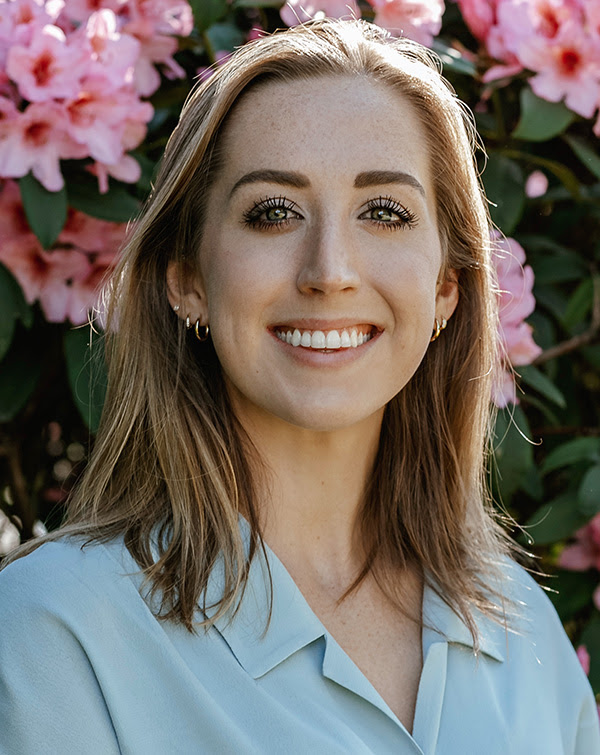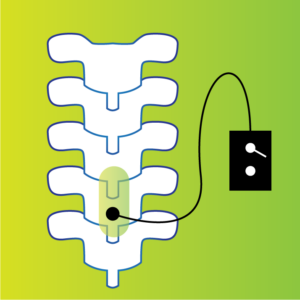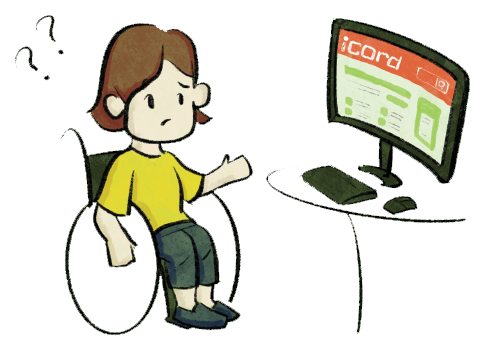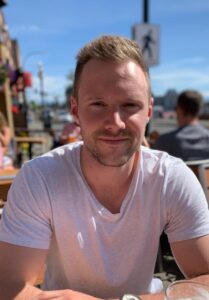

 In this issue, learn about a PhD project that could improve medical imaging, a study on spinal cord stimulation and bladder function, more meaningful involvement of stakeholders in research, award-winning students, and more!
In this issue, learn about a PhD project that could improve medical imaging, a study on spinal cord stimulation and bladder function, more meaningful involvement of stakeholders in research, award-winning students, and more!
We hope you enjoy these feature stories:
- CALIPR Framework transforms myelin imaging
- Testing spinal simulation to improve bladder function
- Integrated Knowledge Translation: shaping the future of SCI research
- Meet some amazing trainees
And these regular columns:
CALIPR Framework transforms myelin imaging
by Jocelyn Chan
A former ICORD Trainee working with ICORD Investigator Shannon Kolind has developed a technique that could improve the speed and accuracy of medical imaging.
Dr. Adam Dvorak graduated with his PhD in Physics in the spring. His thesis project involved developing the “CALIPR” framework, a new method that’s changing the way MRI medical imaging is done, especially for myelin imaging. He recently published a paper in Science Advances detailing his work.
MRI scans are routinely used for medical purposes but are known for being slow. This is particularly true for myelin imaging, which is vital for assessing brain health. Myelin is like insulation for the brain’s wiring, and tracking its health is key to understanding a range of conditions. However, the traditional method of myelin imaging required collecting massive amounts of data, making it a lengthy process. For example, getting a detailed image of the brain could take up to three hours.The CALIPR technique reduces the data needed for these images to just about 4%. This means that what used to take three hours now takes only 7.5 minutes. “It’s like when you’re answering a multiple-choice question and most of the wrong answers are already crossed out, making it easier to find the right one. That’s similar to how CALIPR streamlines MRI image reconstruction,” said Dr. Dvorak.
The reduction in time spent in the MRI scanner is a big plus for patients, and it also means better quality data for doctors. “With CALIPR, we’re not just speeding up the process. We’re also getting clearer, more precise images,” said Dr. Dvorak. “This can really make a difference in how we detect and monitor changes in myelin.”
This advancement is significant for the medical field, especially for people dealing with neurological disorders, since myelin measurement is used as a key indicator for numerous neurological conditions.
CALIPR can be used for the brain or spinal cord and works with MRI scanners from different manufacturers, including smaller, portable ones, making it a versatile tool.
Overall, Dr. Dvorak’s work on the CALIPR framework is a great example of the kind of progress being made in medical imaging. It’s about making the process easier and more efficient for everyone involved – from the patients to the doctors.
The CALIPR framework is already being applied in research studies at UBC, and will soon be used on small, portable MRI scanners spread throughout low- and middle-income countries as part of a large-scale project run by the Bill & Melinda Gates Foundation. Looking far into the future, Dr. Dvorak imagines the possibility of small, head-only MRI scanners sitting in the corner of patient exam rooms, or even next to blood pressure cuffs in pharmacies. This accessible, routine imaging could provide a wealth of data to promote healthy aging and facilitate early detection of brain conditions.
Testing spinal cord stimulation to improve bladder function
by Jocelyn Chan
SCONE™ (SpineX Inc.) is an innovative experimental device which delivers non-invasive stimulation to the spinal cord. ICORD researchers in the laboratory of Dr. Andrei Krassioukov are currently investigating its effects on improving urinary incontinence, primarily in people with neurogenic lower urinary tract dysfunction (NLUTD).
NLUTD is a common neurological condition following spinal cord injury (SCI), stroke, or multiple sclerosis (MS) which primarily causes urinary incontinence and significantly impacts quality of life. Improvements in bladder and other pelvic organ functions, like bowel and sexual function, are rated as top priorities for recovery among affected individuals.

Compared with traditional surgical methods in which electrical devices are implanted inside the spinal cord, the SCONE device is non-invasive and transcutaneous, meaning it applies stimulation through the skin to target specific spinal areas. The goal is to activate dormant spinal cord connections potentially restoring control over the bladder and other pelvic functions.
SCONE therapy is delivered through hydrogel electrode pads that are placed on the skin over the lower part of the spine. Researchers are investigating whether SCONE therapy can lead to improvements in bladder function, such as reduced urgency, decreased need for catheters, restored sensation, increased bladder capacity, and fewer leaks.
SCONE has been tested in a small-scale trial with three participants living with SCI. After spinal stimulation with SCONE, two participants experienced improved sensations in the rectum, and reduced time needed for bowel management (read the publication here). SCONE is now being tested more extensively for its efficacy in treating bladder and bowel dysfunctions by several clinical studies worldwide, with Dr. Krassioukov’s team conducting the Canadian trial on NLUTD.
Although it has been designated as a Breakthrough Device by the US Food and Drug Administration, SCONE has only been approved by Health Canada for use in clinical studies.
Dr. Krassioukov’s team at ICORD is currently recruiting adults aged 18-70 years with a diagnosis of NLUTD who have SCI (AIS A-D), MS, or stroke to participate in the study. The study involves 12 weeks of twice-weekly spinal cord stimulation sessions, each lasting about an hour.
“Participants who have either completed the trial or are currently enrolled are eager to see the day when this therapy is available for home use,” said Dr. Tiev Miller, a postdoctoral fellow who works on spinal cord stimulation in Dr. Krassioukov’s lab.
Interested in participating or learning more? If you’re curious about eligibility or wish to know more, please visit the study page or contact the study coordinator, Jennifer Phan.
Integrated Knowledge Translation:
shaping the future of SCI research at ICORD
by Jocelyn Chan & Alanna Shwed
Science is incredible! Every year, more than 2 million scientific papers are published, many of which contribute to the important field of SCI research. These findings hold the potential to significantly improve the lives of those living with SCI. But there’s a notable issue: only about 14% of this research translates into real-world practice, leaving many valuable insights inaccessible to those who need them most, such as people living with SCI.
Canadian research funders are now challenging scientists to extend the reach of their findings, asking, “How will your work make a real difference?” The answer isn’t straightforward, especially when researchers are not traditionally trained to focus on applications of research during the early stages of experimental design.

To bridge this gap, ICORD embraces the concept of Integrated Knowledge Translation (IKT). Established by a multidisciplinary team in 2020 (pictured, right), the IKT Guiding Principles lay the foundation for research that is deeply connected with the SCI community it aims to serve. IKT is a research approach that emphasizes collaboration and partnership throughout the entire research process. Unlike traditional research methods where knowledge translation (the process of applying research findings into practice) happens after the research is completed, IKT involves stakeholders, such as potential users of the research, in every step of the research process.
“IKT is about creating research that resonates. It’s about integrating the insights of those with lived experience from the start to the finish of any project,” said Alanna Schwed, a PhD student at ICORDinvolved in the IKT initiative.

What does a successful research partnership look like? It is a collaborative effort where scientists and stakeholders, particularly people living with SCI and organizations supporting SCI, share decision-making. This ensures that research outcomes are directly beneficial to the community.
The IKT Guiding Principles are practical tools available for researchers to ensure their work aligns with the SCI community’s needs. These resources are available at www.iktprinciples.com. ICORD is committed to making a difference in the lives of people with SCI through research partnership, engagement, and practical application.
Join the IKT initiative. If you are affected by SCI, involved in research, or passionate about contributing to advancements in the SCI field, your participation is valuable. We invite you to join us in this mission for more impactful SCI research. To learn more or get involved, please contact the IKT Guiding Principles team at ikt.principles@ubc.ca or on X (Twitter) at @IKTPrinciples.
Meet some amazing trainees
Four new awards were presented at the 2023 ICORD Trainee Symposium in October, honouring people who embody the attributes – beyond excellence in publications and presentations – that make a trainee or scientist outstanding.
 ICORD Trainee Outstanding Service Award: Nicole Bailey
ICORD Trainee Outstanding Service Award: Nicole Bailey
This award recognizes trainees who have made outstanding contributions to the ICORD community. While also completing her Masters degree, Nicole Bailey dedicated herself to the ICORD community, with two years as co-Chair of the ICORD Trainee Committee (2022 and 2023), and also single-handedly organized the 2021 Trainee Symposium. She co-developed a new Research Liaison position to help match interested people with ICORD research studies, and served on the hiring committee for the next director.
 Gabriel Dix SCI Community Award: Cameron Gee
Gabriel Dix SCI Community Award: Cameron Gee
This award honours individuals actively making a difference in the lives of people living with SCI. Kwon and Martin Ginis Labs postdoc Cameron Gee has been an active and dedicated member of ICORD, consistently contributing to the SCI community for 11 years. Cam has volunteered as a sit ski instructor with Vancouver Adaptive Snow Sports (2015-2024), with British Columbia Wheelchair Sports Association wheelchair rugby and tennis tournaments (2015-2023), at SCI-BC events (2015-2018), as well as Canada’s para-athletics and para-surfing teams (2019-2023). He also played an important role within the ICORD trainee committee (2017-2019), fostering a sense of community and camaraderie among fellow trainees.
This award is named for Gabriel Dix, a former trainee and staff member in the Martin Ginis Lab before his death in 2021.
 Wolfram Tetzlaff Mentorship Award: Sarah Wheeler
Wolfram Tetzlaff Mentorship Award: Sarah Wheeler
This award acknowledges the hard work and dedication of these mentors to make students feel supported and encouraged, and was presented to Sarah Wheeler, who is a PhD student in the Tetzlaff lab.
Adjudicators received an overwhelming number of nominations for Sarah from current and former students and colleagues in praise of her kindness, patience, thoroughness, adaptability, and genuine concern for the students she trains. She provides guidance, assists with scholarship and grad school applications, and fosters a positive learning environment with dozens of co-op students and volunteers. She also regularly follows up with past students after their departure from ICORD to provide career and academic advice.
This award is named for Dr. Wolfram Tetzlaff, who served as director of ICORD from 2012 to 2023.
 Peggy Assinck Award: Mary Fossey
Peggy Assinck Award: Mary Fossey
This award recognizes ICORD students who best exemplify perseverance, dedication, resilience and passion for SCI research.
In February 2022, Mary was diagnosed with invasive ductal carcinoma. After undergoing chemotherapy, immunotherapy, surgeries and radiation during a year-long medical leave, Mary has returned to life as a PhD student. She has shifted her research focus from physiology to the emerging field of bio-informatics. Her passion for studying secondary complications post-SCI remains strong and her PhD will focus on the heart transcriptome post-SCI, especially identifying new biomarkers and treatments aimed at improving heart function post-injury. Her journey through a life-changing health diagnosis and switching fields from physiology to bio-informatics demonstrates a remarkable resilience. Mary also has been actively fundraising for cancer research (over $6,400 so far!).
This award was named for scientist and para-athlete Peggy Assinck, who completed her PhD with Dr. Wolfram Tetzlaff in 2016.
Congratulations to all the Trainee Award winners!
Sarah, Mary, Cam, and Nicole make ICORD a better place.
This is the space you’re looking for
 The Starlight Children’s Foundation needed an accessible place to hold their annual “Merry Halloween” event, as their usual spot at the Rocky Mountaineer Station was booked. The Blusson Spinal Cord Centre turned out to be a great venue, especially with volunteers from PARC helping to set up.
The Starlight Children’s Foundation needed an accessible place to hold their annual “Merry Halloween” event, as their usual spot at the Rocky Mountaineer Station was booked. The Blusson Spinal Cord Centre turned out to be a great venue, especially with volunteers from PARC helping to set up.
Rick Hansen special airs on CTV
Rick Hansen: Unbreakable, 50 years later aired on CTV on December 2, and is available to watch online.
The 45-minute news special includes an interview between Rick and award winning journalist Sandie Rinaldo, along with footage of Rick returning to the site of his accident for the first time, 50 years later. An interview with ICORD researcher and VCH spine surgeon Dr. Brian Kwon is also included.

Earlier this month, representatives from Spinal Cord Injury BC and colleagues from UBC Okanagan, UBC Vancouver, GF Strong, and the Centre for Addiction and Mental Health came together to co-develop recommendations for smoking cessation counselling for Peer Health Coaches at SCI BC. During the two-day meeting, the team identified and came to consensus on the essential components that must be included in smoking cessation counselling sessions between peer health coaches and participants. Next steps are to develop training to support the adoption and implementation of the recommendations within SCI BC’s Peer Health Coaching program and explore feasibility of conducting a randomized controlled trial.
Watch this space for more updates!
Help us do research
Interested in helping ICORD researchers make SCI preventable, livable, and curable? These research studies (and more) are in need of participants!
Cycling infrastructure project community survey
![]()
Researchers in Dr. Ben Mortenson’s lab are interested in the transportation and cycle lane experiences of cyclists or wheeled mobility device users. This study aims to learn more about how users with disabilities navigate pathways with different devices, and how to improve cycling infrastructure for a variety of users including those with mobility devices. Read More…
Recognition of high-level visual form
![]() Dr. Ipek Oruc’s lab is interested in how human observers recognize complex visual patterns and objects such as letters and faces. You are invited to participate in this study because we would like to understand how visual recognition is normally accomplished. Participation involves viewing displays of visual stimuli on a computer screen. Read More…
Dr. Ipek Oruc’s lab is interested in how human observers recognize complex visual patterns and objects such as letters and faces. You are invited to participate in this study because we would like to understand how visual recognition is normally accomplished. Participation involves viewing displays of visual stimuli on a computer screen. Read More…
Priorities for recovery following SCI
![]() Researchers in Dr. Andrei Krassioukov’s lab are inviting individuals living with SCI, healthcare professionals/clinicians, and researchers/scientists to complete a survey. The goal is to assess the SCI community’s priorities for recovery and assess the understanding of recently developed technologies, like spinal cord stimulation as a rehabilitation strategy. Read More…
Researchers in Dr. Andrei Krassioukov’s lab are inviting individuals living with SCI, healthcare professionals/clinicians, and researchers/scientists to complete a survey. The goal is to assess the SCI community’s priorities for recovery and assess the understanding of recently developed technologies, like spinal cord stimulation as a rehabilitation strategy. Read More…
Neuromodulation for bladder function (SCONE clinical study)
 Researchers in Dr. Andrei Krassioukov’s lab are trying to understand how neurogenic lower urinary tract dysfunction (loss of bladder control) can be recovered after brain or spinal cord damage due to spinal cord injury, multiple sclerosis or stroke. See story above or visit the study page.
Researchers in Dr. Andrei Krassioukov’s lab are trying to understand how neurogenic lower urinary tract dysfunction (loss of bladder control) can be recovered after brain or spinal cord damage due to spinal cord injury, multiple sclerosis or stroke. See story above or visit the study page.
Click here to browse all the ICORD studies currently recruiting participants.
Interested in participating in ICORD research but feeling overwhelmed by the number of studies?
Our Study Liaison is here to help!

 Interested in participating in ICORD research but feeling overwhelmed by the number of studies? Adam Doelman, ICORD PhD candidate and our new study liaison, will help you out. As a study liaison, Adam will work closely with you to narrow down what studies you may be eligible for. Over a few short phone calls, he will ask you questions about your research interests as well as common study inclusion and exclusion criteria. From there he will tailor a list of research studies for you and provide details and contact information for each one. He can also directly connect you with study coordinators if you like. Send him an email to begin your consultation!
Interested in participating in ICORD research but feeling overwhelmed by the number of studies? Adam Doelman, ICORD PhD candidate and our new study liaison, will help you out. As a study liaison, Adam will work closely with you to narrow down what studies you may be eligible for. Over a few short phone calls, he will ask you questions about your research interests as well as common study inclusion and exclusion criteria. From there he will tailor a list of research studies for you and provide details and contact information for each one. He can also directly connect you with study coordinators if you like. Send him an email to begin your consultation!
Partner news
 A great article about the Krassiuokov Lab’s FashionABLE project was published in the November 21 issue of the VCHRI Research Insider. It includes a link to this wonderful video.
A great article about the Krassiuokov Lab’s FashionABLE project was published in the November 21 issue of the VCHRI Research Insider. It includes a link to this wonderful video.
 Free SCIRE Community posters!
Free SCIRE Community posters!
Help us get the word out to clients about SCIRE Community by sharing our high-quality posters in your clinic space! We have large (18 x 24″) and small (8.5 x 11″) options available. Reach out to us at scirecommunity@gmail.com
New accessibility courses
The Rick Hansen Foundation (RHF) is thrilled to announce that, in partnership with the University of Alberta, they are releasing a suite of new or expanded accessibility courses, including a brand-new Inclusion and Accessibility Training for individuals and organizations looking to promote inclusion in the workplace. In addition to this exciting new course, the following will be launching in 2024:
- A new online RHFAC Fundamentals course for professionals interested in increasing their knowledge of meaningful accessibility and Universal Design.
- An updated version of the award-winning RHFAC Professional Training course for individuals who want the skills to rate buildings using RHFAC methodology. Recommended for those who’ve taken RHFAC Fundamentals and/or have the required pre-requisites.
Learn more about RHF accessibility and inclusion training options at RickHansen.com/Courses.
Secure your Early Bird tickets to Canada’s premier conference on accessibility
Early Bird registration is now available for #APN2024: Building Beyond – Canada’s premier conference on accessibility in the built environment. Bundle your ticket with an APN membership and get your conference ticket half-price. In-person spots are limited so secure your spot early. The conference is being held at the Vancouver Convention Centre in Vancouver, BC and virtually on Wednesday, March 27, and Thursday, March 28, 2024. Secure your Early Bird Ticket.
 Praxis Annual Report
Praxis Annual Report
Praxis is pleased to share their 2022 Praxis Annual Report, which focuses on collaboration and how it drives impact. The report summarizes the Institute’s impact on spinal cord injury research, innovation, and care, with stories showing how collaboration builds community, activates advocacy, and directs priorities. Read the report now.
BC Interior SCI Summit: Bridging Education for Lasting Impact
Our BC Interior SCI Summit: Bridging Education for Lasting Impact welcomed 75 attendees in-person and 50 online—from BC and beyond—for a one-day conference. The Summit brought together spinal cord injury clinicians, people with lived experience, and SCI community stakeholders to learn, share experiences, and build connections to support SCI health. Read more about the successful summit here – https://praxisinstitute.org/
If you’d like to stay up-to-date for future events and also recordings from the Summit, please sign up for our Praxis newsletters: https://
 Thanks for reading this issue of The ICORDian – we hope you enjoyed it! Please subscribe and have future issues delivered to your inbox. If you have any comments about this issue or suggestions for future ones, please contact us.
Thanks for reading this issue of The ICORDian – we hope you enjoyed it! Please subscribe and have future issues delivered to your inbox. If you have any comments about this issue or suggestions for future ones, please contact us.
|
Jocelyn Chan, Adam Dvorak, Alanna Shwed, Jennifer Phan, Christina Skinner, Tiev Miller, Claire Shackleton, Katie Ashwell, and Nancy Thorogood for their contributions to this issue of our newsletter.
|






